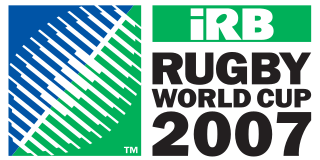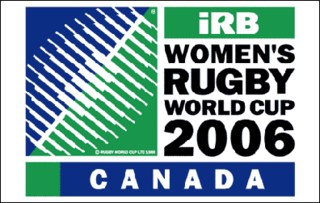Qualifiers
| Africa | Americas | Asia | Europe | Oceania | |
|---|---|---|---|---|---|
| Qualified at 2011 RWC |
| ||||
| Qualified via Regional Slots |
|
|
|
| |
| Qualified via Repechage |
| Tournament details | |
|---|---|
| Dates | 2011 – 2014 |
| No. of nations | 96 |
← 2011 2019 → | |
The qualification process for the 2015 Rugby World Cup began during the pool stages of the 2011 tournament in New Zealand, during which the top three teams from each of the four pools were awarded automatic qualification for the 2015 event. A further eight teams qualified through regional tournaments and the repechage process. The tournament was held in England; [1] it began on 18 September 2015 and finished on 31 October.
| Africa | Americas | Asia | Europe | Oceania | |
|---|---|---|---|---|---|
| Qualified at 2011 RWC |
| ||||
| Qualified via Regional Slots |
|
|
|
| |
| Qualified via Repechage |
Qualification started in the pool stage of RWC 2011. 12 teams received an automatic qualification berth by finishing in the top 3 positions of their respective pools.
A further 8 berths for the tournament were then available through regional tournaments and the repechage process.
The non-automatic qualification process began on 24 March 2012, by the end of which 80 teams had competed over 184 matches.
The pool draw for the 2015 Rugby World Cup took place on 3 December 2012. As with the 2011 tournament, the top 12 teams were grouped into 3 bands for the pool draw as per their IRB Rankings on that date, [2] while the other 8 qualifying teams were split into a fourth and fifth band. [3] One team from each band was drawn into each pool.
Seven of the final eight places were assigned to different regions by the IRB; the last place was decided by a repechage series.
Regional Qualification began on 24 March 2012, when Mexico hosted and defeated Jamaica in Mexico City. The match was refereed by Craig Joubert, who refereed the 2011 Rugby World Cup Final.
In all, 96 national teams have been involved in the 2015 World Cup - 12 as automatic qualifiers and 84 as entrants in the qualification rounds.
| Region | Automatic qualifiers | Teams in qualifying process | Qualifying places | Qualifying teams | World Cup pools | Repechage places | Repechage teams |
|---|---|---|---|---|---|---|---|
| Africa (CAR) | 1 | 13* | 1 | C | 1 | ||
| Americas (NACRA/CONSUR) | 1 | 18 | 2 | D B | 1 | ||
| Asia (ARFU) | 0 | 17 | 1 | B | 1 | ||
| Europe (FIRA–AER)† | 6 | 31 | 2 | C D | 1 | ||
| Oceania (FORU) | 4 | 5 | 1 | A | 0 | none | |
| TOTALS | 12 | 84 | 7 | 4 | (1 WC Place) |
*One additional team, Cameroon, withdrew prior to playing any games.
†During the qualification cycle, FIRA–AER changed its name to Rugby Europe.
Following the end of the regional qualification process, four teams (one from each region, except Oceania) took part in the Repechage process for the final spot at the Rugby World Cup. The final was played over a two-match home and away basis. The team with the higher aggregate score, Uruguay, became the 20th and final team at the 2015 Rugby World Cup.
| Semi-Final | Final | ||||||||||
| 23 | |||||||||||
| 15 | |||||||||||
| 22 | 27 | 49 | |||||||||
| 21 | 36 | 57 | |||||||||
| 28 | |||||||||||
| 3 | |||||||||||
The 1999 Rugby World Cup was the fourth Rugby World Cup, the quadrennial international rugby union championship. It was principally hosted by Wales, and was won by Australia. This was the first Rugby World Cup to be held in the sport's professional era.

The 2007 Rugby World Cup was the sixth Rugby World Cup, a quadrennial international rugby union competition inaugurated in 1987. Twenty nations competed for the Webb Ellis Cup in the tournament, which was hosted by France from 7 September to 20 October. France won the hosting rights in 2003, beating a bid from England. The competition consisted of 48 matches over 44 days; 42 matches were played in ten cities throughout France, as well as four in Cardiff, Wales, and two in Edinburgh, Scotland.

Repechage is a practice in series competitions that allows participants who failed to meet qualifying standards by a small margin to continue to the next round. A well known example is the wild card system.

The 2011 Rugby World Cup was the seventh Rugby World Cup, a quadrennial international rugby union competition inaugurated in 1987. The International Rugby Board (IRB) selected New Zealand as the host country in preference to Japan and South Africa at a meeting in Dublin on 17 November 2005. The tournament was won by New Zealand, who defeated France 8–7 in the final. The defending champions, South Africa, were eliminated by Australia 11–9 in the quarter-finals. The result marked the third time that the tournament was won by the country that hosted the event.
There were 20 places available for the 2007 Rugby World Cup held in France. The 86 teams taking part in regional qualifying competitions together with the 8 teams which have qualified automatically brings to 94 the total number of teams participating in the 2007 Rugby World Cup.

The 2006 Women's Rugby World Cup took place in Edmonton, Alberta, Canada. The tournament began on 31 August and ended on 17 September 2006. The 2006 tournament was the third World Cup approved by the IRB, the previous two being held 2002 in Spain and in the Netherlands, in 1998. The Black Ferns of New Zealand won the 2006 World Cup, defeating England in the final, as they had in 2002. It was New Zealand's third successive title.

The 2015 Rugby World Cup was the eighth Rugby World Cup, the quadrennial rugby union world championship. The tournament was hosted by England from 18 September to 31 October. Of the 20 countries competing in the World Cup in 2011, there was only one change: Uruguay replaced Russia. This was the first World Cup with no new teams to the tournament.

Rugby World Cup qualification is a process that determines which nations will compete at the Rugby World Cup, a men's rugby union competition.
The 2010 Women's Rugby World Cup was the sixth edition of the Women's Rugby World Cup and was held in England. The International Rugby Board Executive Committee selected the host union following a recommendation from the Rugby World Cup Limited board after considering bids from the Rugby Football Union and the German Rugby Union – it had been England's third successive bid after being rejected in 2002 and 2006. The tournament was again being organised by the International Rugby Board (IRB) as opposed to the host union, and included five matches for all teams played on 20, 24, 28 August and 1 and 5 September. In May 2009 it was announced that the semi final, 3rd place play off and final would take place at The Stoop and not Twickenham as had previously been suggested. Pool games were held at the Surrey Sports Park in Guildford.

Rugby union in Asia is a growing sport, and is governed by the Asian Rugby Football Union (ARFU). As of December 2009 there are 28 ARFU member unions, of whom 15 are full members of World Rugby, and six further associate members of World Rugby in Asia. The flagship tournament for promoting the sport in Asia is the Asian Five Nations, which launched in 2008, and which most recently in 2011 saw the national teams of Hong Kong, Japan, Kazakhstan, Sri Lanka and the UAE, compete in the main tournament.

2011 Rugby World Cup qualifying began at the 2007 tournament in France, where twelve teams earned a place in the finals of the tournament, this automatically qualified them for the 2011 Rugby World Cup in New Zealand.

The 2014 Women's Rugby World Cup was the seventh edition of the Women's Rugby World Cup, and the sixth held in Europe. The World Cup Final took place on 17 August.
The Federation of Oceania Rugby Unions (FORU) section of the 2015 Rugby World Cup qualification involved five teams competing for one spot in the final tournament in England.

For the 2015 Rugby World Cup qualifying, there were three inter-confederation play-offs to determine the final qualification spot to the 2015 Rugby World Cup. The process ended with the 20th and final team to qualify for the World Cup. Four teams, the best non-qualifier from each region except Oceania, competed for the last place at the Rugby World Cup finals in England. Uruguay won the final play, thus becoming the 20th qualifier for the World Cup and joined hosts England, Australia, Wales and Fiji in Pool A.

The qualification process for the 2019 Rugby World Cup in Japan began during the pool stages of the 2015 tournament in England, during which the top three teams from each of the four pools were awarded automatic qualification for the 2019 event. A further eight teams qualified through regional, cross-regional tournaments and the repechage process.

Qualifying for the 2019 Rugby World Cup for the Americas began in March 2016, where across 3 years, 20 teams competed for two direct qualification spots into the final tournament, and one spot in the Repechage tournament. For qualification purposes, the two Americas regions Rugby Americas North and Sudamérica Rugby formed the Americas region to compete for the two Americas berths in the World Cup.
The qualification process for the 2017 Women's Rugby World Cup began on 14 February 2015. Twelve teams qualified for the tournament, which was held in Ireland in 2017.
Qualifying for the 2019 Rugby World Cup for Oceania Rugby began in June 2016, where across 2 years, 3 teams competed for two direct qualification spots from Oceania. Two places were available to Oceania in a cross-regional play-off series' to qualify for the World Cup and or advance through the Repechage.

The 2021 Rugby World Cup was the ninth staging of the women's Rugby World Cup, as organised by World Rugby. It was held from 8 October to 12 November 2022 in Auckland and Whangārei, New Zealand. It was originally scheduled to be held in 2021, but was postponed by one year due to the COVID-19 pandemic.
The qualification process for the 2023 Rugby World Cup in France began during the pool stages of the 2019 tournament in Japan, at which the top three teams from each of the four pools qualified automatically for the 2023 event. A further eight teams will qualify through regional, cross-regional play-offs and the repechage process.